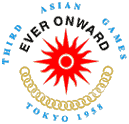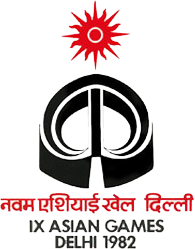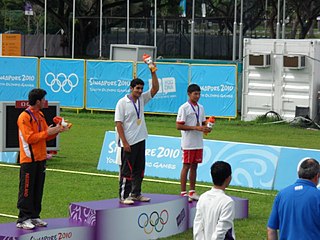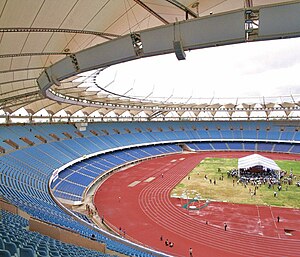
The Asian Games, also known as Asiad, is a continental multi-sport event held every fourth year among athletes from all over Asia. The Games were regulated by the Asian Games Federation (AGF) from the first Games in New Delhi, India in 1951, until the 1978 Games. Since the 1982 Games, they have been organized by the Olympic Council of Asia (OCA), after the breakup of the Asian Games Federation. The Games are recognized by the International Olympic Committee (IOC) and are described as the second largest multi-sport event after the Olympic Games.
The 1992 Winter Olympics, officially known as the XVI Olympic Winter Games, were a winter multi-sport event held in Albertville, France, from February 8 to February 23. A total of 1,801 athletes representing 64 National Olympic Committees (NOCs) participated in 57 events from 12 different sports and disciplines. In a break from tradition, the medals were primarily made of crystal rather than metal: gold, silver, or bronze was used only on the border.

The 1951 Asian Games, officially known as the First Asian Games, was a multi-sport event celebrated in New Delhi, India from 4 to 11 March 1951. The Games received names like First Asiad and 1951 Asiad. A total of 489 athletes representing 11 Asian National Olympic Committees (NOCs) participated in 57 events from eight sports and discipline. The Games was the successor of the Far Eastern Games and the revival of the Western Asiatic Games. The 1951 Asiad were originally scheduled to be held in 1950, but postponed until 1951 due to delays in preparations. On 13 February 1949, the Asian Games Federation was formally established in Delhi, with Delhi unanimously announced as the first host city of the Asian Games.

The 2002 Asian Games, officially known as the XIV Asian Games and also known as Busan 2002, were an international multi-sport event held in Busan, South Korea from September 29 to October 14, 2002. Due schedule impediments the football tournament started two days before the opening ceremonies.

The 2006 Asian Games, officially known as the XV Asiad, was an Asian multi-sport event held in Doha, Qatar from December 1 to 15, 2006, with 424 events in 39 sports featured in the games. Doha was the first city in its region and only the second in West Asia to host the games. The city will host the games again in 2030.

The 1958 Asian Games, officially the Third Asian Games and commonly known as Tokyo 1958, was a multi-sport event held in Tokyo, Japan, from 24 May to 1 June 1958. It was governed by the Asian Games Federation. A total of 1,820 athletes representing 20 Asian National Olympic Committees (NOCs) participated in the Games. The program featured competitions in 13 different sports encompassing 97 events, including four non-Olympic sports, judo, table tennis, tennis and volleyball. Four of these competition sports – field hockey, table tennis, tennis and volleyball – were introduced for the first time in the Asian Games.

The 9th Asian Games were held from 19 November to 4 December 1982, in Delhi, India. 74 Asian and Asian Games records were broken at the event. This was also the first Asiad to be held under the aegis of the Olympic Council of Asia. Delhi joined Bangkok as the cities to host multiple editions of the Asian Games up to this point. Later, Jakarta and Doha would enter this group.

Kartar Singh is an Indian wrestler who won gold medals at the Asian Games in 1978 and 1986. He stood 7th at the 1984 Summer Olympics – Men's freestyle 100 kg Wrestling.

The 2010 Summer Youth Olympics, officially known as the Singapore 2010 Youth Olympic Games (YOG), were an international multi-sport event held in Singapore from 14 to 26 August 2010. The event was the inaugural Youth Olympic Games, and it saw 3,531 athletes between 14 and 18 years of age competing in 201 events in 26 sports. This medal table ranks the 204 participating National Olympic Committees (NOCs) by the number of gold medals won by their athletes. The Kuwait Olympic Committee was suspended by the International Olympic Committee (IOC) prior to the Games, but Kuwaiti athletes were allowed to participate and the country is listed in the table, bearing the Olympic flag.
The 2010 Commonwealth Games, was a multi-sport event held in Delhi, India from 3 to 14 October 2010. It was the first time that India hosted the Commonwealth Games and the second time it was held in Asia after Kuala Lumpur, Malaysia in 1998. A total of 6,081 athletes from 71 Commonwealth Games Associations (CGAs) participated in this Games, competing in 272 events in 21 sports.

The 2010 Asian Games, also known as the XVI Asiad, was a multi-sport event held in Guangzhou, China from 12 to 27 November 2010. The event saw 9,704 athletes from 45 National Olympic Committees (NOCs) competing in 476 events in 42 sports. This medal table ranks the participating NOCs by the number of gold medals won by their athletes.

The 2002 Asian Games was a multi-sport event held in Busan, South Korea from September 29 to October 14, 2002. Busan was the second South Korean city to host the Games, after Seoul in 1986. A total of 6,572 athletes—4,605 men and 1,967 women—from 44 Asian National Olympic Committees (NOCs) participated in 38 sports divided into 419 events. The number of competing athletes was higher than the 1998 Asian Games, in which 6,544 athletes from 41 NOCs participated. It was the first time in the history of the Asian Games that all 44 member nations of the Olympic Council of Asia (OCA) participated in the Games. Afghanistan returned after the fall of the Taliban government in the midst of ongoing war; East Timor, newest member of the OCA made its debut; and North Korea competed for the first time in an international sporting event hosted by South Korea. Both nations marched together at the opening ceremony with a Korean Unification Flag depicting the Korean Peninsula as United Korea.

The 1958 Asian Games, officially known as the Third Asian Games, was a multi-sport event held in Tokyo, Japan, from 24 May to 1 June 1958. A record total of 1,820 athletes representing 20 Asian National Olympic Committees (NOCs) participated in 13 sports divided into 97 events. The tradition of the torch relay was introduced for the first time in the Asian Games, and the Games cauldron was ignited by the first Japanese Olympic gold medallist and the first Asian Olympic champion in an individual event, Mikio Oda.

The 2011 Asian Winter Games, officially known as the 7th Asian Winter Games, was a winter multi-sport event held in Astana and Almaty, Kazakhstan, from January 30 and to February 6, 2011. A total of 991 athletes representing 26 National Olympic Committees (NOCs) participated in these games, competing in 69 events from 11 different sports and disciplines.[a]

The 1998 Asian Games was a multi-sport event held in Bangkok, Thailand from December 6 to December 20, 1998. A total of 6,544 athletes from 41 Asian National Olympic Committees (NOCs) participated in these games, competing in 376 events in 36 sports. This edition of the Games marked the addition of three sports—squash, rugby union and cue sports—to the list of Asian Games sports; squash was included after seven years of lobbying by the Asian Squash Federation.

The 1974 Asian Games was a multi-sport event held in Tehran, Iran from September 1, 1974, to September 16, 1974. This was the first time that Asian Games were celebrated in any Middle East country. A total of 3,010 athletes selected from 25 Asian National Olympic Committees participated in 16 sports divided into 202 events. The number of participating countries was the greatest in Asian Games history, eighteen nations competed in Bangkok, host of the 1970 Asian Games. Fencing, gymnastics (artistic) and women's basketball were included for the first time; while sailing—which made its debut in the previous Asian Games—was not included, however since 1978, sailing is a part of the Asian Games sports.
The 1978 Asian Games, was a multi-sport event held in Bangkok, Thailand from 9 December to 20 December 1978. Originally, the host city was to be Singapore, but it dropped its plan to host the Games due to financial problems. Then the capital of Pakistan, Islamabad, was subsequently chosen to host the games. However Pakistan also dropped its plan to host the games due to conflicts with Bangladesh and India.
The 1994 Asian Games, was a multi-sport event held in Hiroshima, Japan from 2 to 16 October 1994. They were the first Asian Games to be held in a non-capital city. The main theme of this edition was to promote peace and harmony among Asian nations. It was emphasized by the host because the venue was the site of the first atomic bomb attack in 1945. A total of 6,828 athletes from 42 National Olympic Committees (NOCs) participated in these games, competing in 34 sports. Baseball, Karate, Modern Pentathlon and Soft tennis were included for the first time. This medal table ranks the participating NOCs by the number of gold medals won by their athletes.
The women's middleweight event at the 2006 Asian Games took place on 9 December 2006 at Qatar SC Indoor Hall, Doha, Qatar.
The 2018 Asian Games, officially known as the XVIII Asiad, is the largest sporting event in Asia governed by Olympic Council of Asia (OCA). It was held at Jakarta and Palembang, Indonesia between 18 August – 2 September 2018, with 465 events in 40 sports and disciplines featured in the Games. This resulted in 465 medal sets being distributed.















